









Andrew Lang Biography
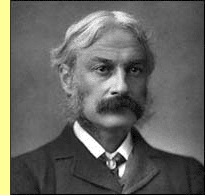 Andrew
Lang (born March 13, 1844, Selkirk, Scotland –
died July 20, 1912, Banchory, Kincardineshire) was a
prolific Scots man of letters. He was a Scottish historian, translator,
journalist,
lecturer, biographer, poet, novelist, literary critic, and
contributor to anthropology. He now is best known as having created one
of the most important collections of folk and fairy tales in the
world—his "color" fairy book series. Lang often collaborated
with
his wife, Leonore Blanche Alleyne, in
adapting and translating the stories, which were taken from
countries throughout the world.
Andrew
Lang (born March 13, 1844, Selkirk, Scotland –
died July 20, 1912, Banchory, Kincardineshire) was a
prolific Scots man of letters. He was a Scottish historian, translator,
journalist,
lecturer, biographer, poet, novelist, literary critic, and
contributor to anthropology. He now is best known as having created one
of the most important collections of folk and fairy tales in the
world—his "color" fairy book series. Lang often collaborated
with
his wife, Leonore Blanche Alleyne, in
adapting and translating the stories, which were taken from
countries throughout the world.
Lang was also a prolific author of works both fiction and non-fiction; he wrote his own fairy tales such as Prince Prigio (1889) and Prince Ricardo of Pantouflia (1893), and wrote numerous historical texts including A Short History of Scotland (1911). His collected works include essays on religion, myths, and magic under such titles as Custom and Myth (1884), Myth, Ritual, and Religion (1886), and The Making of Religion (1900). Andrew Lang was great friends with Robert Louis Stevenson and H. Rider Haggard, with whom he wrote The World's Desire (1890).
The Andrew Lang lectures at the University of St Andrews are named for him.
Biography
Andrew Lang was the eldest of the eight children of John Lang, town clerk of Selkirk, and his wife, Jane Plenderleath Sellar, daughter of Patrick Sellar, factor to the first duke of Sutherland. He was educated at Selkirk grammar school, and at the Edinburgh Academy. He next attended University of St. Andrews, which now hosts the "Andrew Lang Lecture Series" in his honor. Lang then went to Balliol College, Oxford, England, where he took a first class in the final classical schools in 1868, becoming an honorary Fellow of Merton College (1865 to 1874).
Lang studied Latin and Greek, especially the
Homeric texts, and translated the French poetry of
François Villon, Pierre de Ronsard, and others. Lang was also writing
his own poetry, his first publication was a volume of metrical
experiments, Ballads
and Lyrics of Old France (1872). This was
followed at intervals by other volumes of verse: Ballads in Blue China
(1880, enlarged edition, 1888); Helen of Troy
(1882); Ballads
and Verses Vain
(1884)— selected by Mr. Austin Dobson; Rhymes à la Mode
(1884); Grass of
Parnassus (1888); Ban
and Arriere Ban (1894); and New Collected Rhymes
(1905).
Lang's childhood days in the Scottish Borderland of Selkirk, the land
of Bonnie Prince Charlie and his
Highlanders, his jaunts through heath and wood, fishing in the local
streams, and reading such books as Grimm's
Fairy Tales and the works of
William Shakespeare, Madame d'Aulnoy, and Sir Walter Scott inspired his
love of folklore, magic, and myth. Lang moved to London in 1875 to try
his hand at journalism, the same year he married Leonore Blanche
Alleyne (April 17, 1875, youngest daughter of C. T. Alleyne of
Clifton and Barbados). They would have no children. While Lang was
the editor of, and
wrote a popular column for, Longman's
Magazine, he continued his
prodigious output, with dozens of articles and essays published in
newspapers and magazines, including Cornhill
Magazine, Macmillan's, The
Daily Post, Fortnightly Review, the Overland Mail, Fraser's
and Time
magazine. His dry wit and sardonic style earned him much acclaim. He
was an avid golfer and fisherman, and he and Leonore traveled to France
and Italy. As a
journalist, poet, critic and historian, he soon made a reputation as
one of the most able and versatile writers of the day.
He edited The Poems and Songs of Robert Burns (1896), and was responsible for The Life and Letters (1897) of JG Lockhart, and The Life, Letters and Diaries (1890) of Sir Stafford Northcote, 1st Earl of Iddesleigh. Lang discussed literary subjects with the same humor and extremely dry irony that marked his criticism of fellow folklorists, in Books and Bookmen (1886), Letters to Dead Authors (1886), Letters on Literature (1889), and How to Fail in Literature (1890).
He collaborated with S.H. Butcher in a prose translation (1879) of Homer's Odyssey, and with E. Myers and Walter Leaf in a prose version (1883) of the Iliad, both still noted for their archaic but attractive style. Other works include Homer And The Study Of Greek found in Essays In Little (1891), Homer and the Epic (1893); a prose translation of The Homeric Hymns (1899), with literary and mythological essays in which he draws parallels between Greek myths and other mythologies; and Homer and his Age (1906). His conservative bent (he was a Homeric scholar and advocated romance over realism) may have been responsible for his hostility to the novels of Henry James and Thomas Hardy and his support of Robert Louis Stevenson and H. Rider Haggard.
Lang is now chiefly known for his publications on folklore and mythology. The earliest of his publications in this area is Custom and Myth (1884). In Myth, Ritual and Religion (1887) he explained the "irrational" elements of mythology as survivals from more primitive "savage" forms. Lang's Making of Religion (an idealization of savage animism, and a compilation of his 1888 Gifford Lectures) he maintained the existence of high spiritual ideals among savage races, and made comparisons between savage practices and the occult phenomena among the "civilized" modern races. His Blue Fairy Book (1889) was a beautifully produced and illustrated edition of fairy tales that has become an instant classic. This was followed by many other collections of fairy tales, collectively known as Andrew Lang's Fairy Books. Lang examined the origins of totemism in Social Origins (1903), together with JB Atkinson's Primal Law.
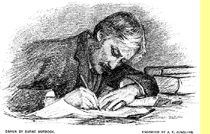 As the
century turned, so did
his interests: Scottish history became his focus. He gave new
information about the continental career of the Young Pretender in
Pickle the Spy (1897), an account of Alestair Ruadh
MacDonnell, whom he
identified with Pickle, a notorious Hanoverian spy. This was followed
by The Companions of
Pickle (1898) and a monograph on Prince Charles
Edward (1900). His substantial History of Scotland from the
Roman
Occupation (1900–1907) had a highly unusual perspective.
Lang's writings on Scottish history are characterized by a scholarly
care for detail, a piquant literary style, and a gift for disentangling
complicated questions. The
Mystery of Mary Stuart (1901, revised ed., 1904) was a
consideration of the fresh light thrown on Mary, Queen of
Scots by the
Lennox manuscripts in the University Library, Cambridge, strengthening
and approving
of her and criticizing her accusers by restating
their dishonesty. More controversial was
his critique of John Knox in John
Knox and the Reformation (1905).
As the
century turned, so did
his interests: Scottish history became his focus. He gave new
information about the continental career of the Young Pretender in
Pickle the Spy (1897), an account of Alestair Ruadh
MacDonnell, whom he
identified with Pickle, a notorious Hanoverian spy. This was followed
by The Companions of
Pickle (1898) and a monograph on Prince Charles
Edward (1900). His substantial History of Scotland from the
Roman
Occupation (1900–1907) had a highly unusual perspective.
Lang's writings on Scottish history are characterized by a scholarly
care for detail, a piquant literary style, and a gift for disentangling
complicated questions. The
Mystery of Mary Stuart (1901, revised ed., 1904) was a
consideration of the fresh light thrown on Mary, Queen of
Scots by the
Lennox manuscripts in the University Library, Cambridge, strengthening
and approving
of her and criticizing her accusers by restating
their dishonesty. More controversial was
his critique of John Knox in John
Knox and the Reformation (1905).
He also wrote monographs on James VI and the Gowrie Mystery (1902) and The Portraits and Jewels of Mary Stuart (1906). The Valet's Tragedy (1903), which takes its title from an essay on Dumas's Man in the Iron Mask, collects twelve papers on historical mysteries, and A Monk of Fife (1896) is a fictitious narrative purporting to be written by a young Scot in France in 1429-1431. Louis Stott says 'Lang deserves a place as an important Scottish writer.'
Many honors were bestowed on Lang during his lifetime including Doctorates in Classics from the University of St. Andrews and Oxford, in 1885 and 1904 respectively. He was Gilford lecturer at St. Andrews in 1888. Lang was one of the founders of "Psychical Research" and his other writings on anthropology include The Book of Dreams and Ghosts (1897), Magic and Religion (1901) and The Secret of the Totem (1905). He served as President of the Society for Psychical Research in 1911.
Lang was active as a journalist in various ways, ranging from sparkling "leaders" for the Daily News to miscellaneous articles for the Morning Post, and for many years he was literary editor of Longman's Magazine; no critic was in more request, whether for occasional articles and introductions to new editions or as editor of reprints.
After many years of ill-health, Andrew Lang died on July 20, 1912, of angina pectoris (heart failure) at the Tor-na-Coille Hotel in Banchory, survived by his wife. He was buried in the cathedral precincts at St Andrews. His ‘influential’ Highways and Byways of the Border was completed by his wife.
 LIST
OF WORKS
LIST
OF WORKS

| The Andrew Lang "Color" Fairy Books |
| The
Blue Fairy Book 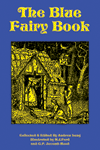 Pub. 1889 |
The
Red Fairy Book 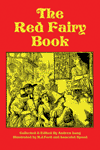 Pub. 1890 |
The
Green Fairy Book 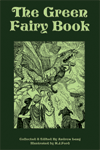 Pub. 1892 |
The
Yellow Fairy Book 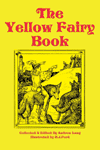 Pub. 1894 |
The
Pink Fairy Book 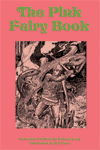 Pub. 1897 |
The
Grey Fairy Book 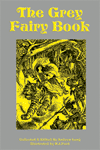 Pub. 1900 |
| The
Violet Fairy Book 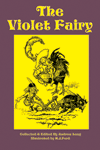 Pub. 1901 |
The
Crimson Fairy Book 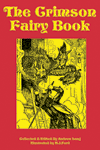 Pub. 1903 |
The
Brown Fairy Book 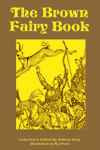 Pub. 1904 |
The
Orange Fairy Book 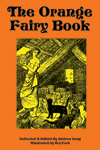 Pub. 1904 |
The
Olive Fairy Book 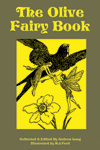 Pub. 1907 |
The
Lilac Fairy Book 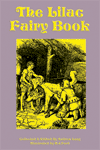 Pub. 1910 |
To 1884
- St Leonards Magazine. 1863. This was a reprint of several articles that appeared in the St Leonards Magazine that Lang edited at St Andrews University. Includes the following Lang contributions: Pages 10-13, Dawgley Manor; A sentimental burlesque; Pages 25-26, Nugae Catulus; Pages 27-30, Popular Philosophies; pages 43-50 are ‘Papers by Eminent Contributors’, seven short parodies of which six are by Lang.
- The Ballads and Lyrics of Old France (1872)
- The Odyssey Of Homer Rendered Into English Prose (1879) translator with Samuel Henry Butcher
- Aristotle's Politics Books I. III. IV. (VII.). The Text of Bekker. With an English translation by W. E. Bolland . Together with short introductory essays by A. Lang To page 106 are Lang's Essays, pp. 107-305 are the translation. Lang's essays without the translated text were later published as The Politics of Aristotle. Introductory Essays. 1886.
- The Folklore of France (1878)
- Specimens of a Translation of Theocritus. 1879. This was an advance issue of extracts from ‘Theocritus, Bion and Moschus rendered into English prose’
- XXII Ballades in Blue China (1880)
- Oxford. Brief historical & descriptive notes (1880)
- 'Theocritus Bion and Moschus. Rendered into English Prose with an Introductory Essay. 1880.
- Notes by Mr A. Lang on a collection of pictures by Mr J. E.Millais R.A. exhibited at the Fine Arts Society Rooms. 148 New Bond Street. 1881.
- The Library: with a chapter on modern illustrated books. 1881.
- The Black Thief. A new and original drama (Adapted from the Irish) in four acts.(1882)
- Helen of Troy, her life and translation. Done into rhyme from the Greek books. 1882.
- The Most Pleasant and Delectable Tale of the Marriage of Cupid and Psyche (1882) with William Aldington
- The Iliad of Homer, a prose translation (1883) with Walter Leaf and Ernest Myers
- Custom and Myth (1884)
- The Princess Nobody: A Tale of Fairyland (1884)
- Ballads and Verses Vain (1884) selected by Austin Dobson
- Rhymes à la Mode (1884)
- Much Darker Days. By A. Huge Longway. (pseudonym, 1884)
- Household tales; their origin, diffusion, and relations to the higher myths. [1884]. Separate pre-publication issue of the "introduction" to Bohn's edition of Grimm's Household tales.
1885-1889
- That Very Mab (1885) with May Kendall
- Books and Bookmen (1886)
- Letters to Dead Authors (1886)
- In the Wrong Paradise (1886) stories
- The Mark of Cain (1886) novel
- Lines on the inaugural meeting of the Shelley Society. Reprinted for private distribution from the Saturday Review of 13 March 1886 and edited by Thomas Wise (1886)
- La Mythologie Traduit de L’Anglais par Léon Léon Parmentier. Avec une préface par Charles Michel et des Additions de l'auteur. (1886) Never published as a complete book in English, although there was a Polish translation. The first 170 pages is a translation of the article in the ‘Encyclopaedia Britannica’. The rest is a combination of articles and material from ‘Custom and Myth’.
- Almae matres (1887)
- He (1887 with Walter Herries Pollock) parody
- Aucassin and Nicolette (1887)
- Myth, Ritual and Religion (2 vols., 1887)
- Johnny Nut and the Golden Goose. Done into English from the French of Charles Deulin (1887)
- Grass of Parnassus. Rhymes old and new. (1888)
- Perrault's Popular Tales (1888)
- Gold of Fairnilee (1888)
- Pictures at Play or Dialogues of the Galleries (1888) with W. E. Henley
- Prince Prigio (1889)
- The Blue Fairy Book (1889) (illustrations by Henry J. Ford and C.P. Jacomb Hood)
- Letters on Literature (1889)
- Lost Leaders (1889)
- Ode to Golf. Contribution to On the Links; being Golfing Stories by various hands (1889)
- The Dead Leman and other tales from the French (1889) translator with Paul Sylvester
1890–1899
- The Red Fairy Book (1890) (illustrations by Henry J. Ford and Lancelot Speed)
- The World's Desire (1890) with H. Rider Haggard
- Old Friends: Essays in Epistolary Parody (1890)
- The Strife of Love in a Dream, Being the Elizabethan Version of the First Book of the Hypnerotomachia of Francesco Colonna (1890)
- The Life, Letters and Diaries of Sir Stafford Northcote, 1st Earl of Iddesleigh (1890)
- Etudes traditionnistes (1890)
- How to Fail in Literature (1890)
- The Blue Poetry Book (1891) (illustrations by Henry J. Ford)
- Essays in Little (1891)
- On Calais Sands (1891)
- The Green Fairy Book (1892) (illustrations by Henry J. Ford)
- The Library with a Chapter on Modern English Illustrated Books (1892) with Austin Dobson
- William Young Sellar (1892)
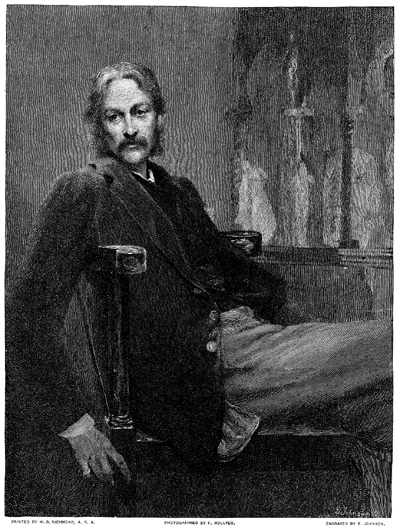
- The True Story Book (1893)
- Homer and the Epic (1893)
- Prince Ricardo of Pantouflia (1893)
- Waverley Novels (by Walter Scott), 48 volumes (1893) editor
- St. Andrews (1893)
- Montezuma's Daughter (1893) with H. Rider Haggard
- Kirk's Secret Commonwealth (1893)
- The Tercentenary of Izaak Walton (1893)
- The Yellow Fairy Book (1894) (illustrations by Henry J. Ford)
- Ban and Arrière Ban (1894)
- Cock Lane and Common-Sense (1894)
- Memoir of R. F. Murray (1894)
- The Red True Story Book (1895)
- My Own Fairy Book (1895)
- Angling Sketches (1895)
- A Monk of Fife (1895)
- The Voices of Jeanne D'Arc (1895)
- The Animal Story Book (1896)
- The Poems and Songs of Robert Burns (1896) editor
- The Life and Letters of John Gibson Lockhart (1896) two volumes
- The Nursery Rhyme Book (1897)
- The Miracles of Madame Saint Katherine of Fierbois (1897) translator
- The Pink Fairy Book (1897) (illustrations by Henry J. Ford)
- A Book of Dreams and Ghosts (1897)
- Pickle the Spy (1897)
- Modern Mythology (1897)
- The Companions of Pickle (1898)
- The Arabian Nights Entertainments (1898)
- The Making of Religion (1898)
- Selections from Coleridge (1898)
- Waiting on the Glesca Train (1898)
- The Red Book of Animal Stories (1899)
- Parson Kelly (1899) Co-written with A. E. W. Mason
- The Homeric Hymns (1899) translator
- The Works of Charles Dickens in Thirty-four Volumes (1899) editor
1900–1909
- The Grey Fairy Book (1900) (illustrations by Henry J. Ford)
- Prince Charles Edward (1900)
- Parson Kelly (1900)
- The Poems and Ballads of Sir Walter Scott, Bart (1900) editor
- A History of Scotland - From the Roman Occupation (1900 – 1907) four volumes
- Notes and Names in Books (1900)
- Alfred Tennyson (1901)
- Magic and Religion (1901)
- Adventures Among Books (1901)
- The Violet Fairy Book (1901) (illustrations by Henry J. Ford)
- The Mystery of Mary Stuart (1901, new and revised ed., 1904)
- The Book of Romance (1902)
- The Disentanglers (1902)
- James VI and the Gowrie Mystery (1902)
- Notre-Dame of Paris (1902) translator
- The Young Ruthvens (1902)
- The Gowrie Conspiracy: the Confessions of Sprott (1902) editor
- The Crimson Fairy Book (1903) (illustrations by Henry J. Ford)
- Lyrics (1903)
- Social England Illustrated (1903) editor
- The Story of the Golden Fleece (1903)
- The Valet's Tragedy (1903)
- Social Origins (1903) with Primal Law by James Jasper Atkinson
- The Snowman and Other Fairy Stories (1903)
- Stella Fregelius: A Tale of Three Destinies (1903) with H. Rider Haggard
- The Brown Fairy Book (1904) (illustrations by Henry J. Ford)
- Historical Mysteries (1904)
- The Secret of the Totem (1905)
- New Collected Rhymes (1905)
- John Knox and the Reformation (1905)
- The Puzzle of Dickens's Last Plot (1905)
- The Clyde Mystery. A Study in Forgeries and Folklore (1905)
- Adventures among Books (1905)
- Homer and His Age (1906)
- The Red Romance Book (1906)
- The Orange Fairy Book (1906) (illustrations by Henry J. Ford)
- The Portraits and Jewels of Mary Stuart (1906)
- Life of Sir Walter Scott (1906)
- The Story of Joan of Arc (1906)
- New and Old Letters to Dead Authors (1906)
- Tales of a Fairy Court (1907)
- The Olive Fairy Book (1907) (illustrations by Henry J. Ford)
- Poets' Country (1907) editor, with Churton Collins, W. J. Loftie, E. Hartley Coleridge, Michael Macmillan
- The King over the Water (1907)
- Tales of Troy and Greece (1907)
- The Origins of Religion (1908) essays
- The Book of Princes and Princesses (1908)
- Origins of Terms of Human Relationships (1908)
- Select Poems of Jean Ingelow (1908) editor
- Three Poets of French Bohemia (1908)
- The Red Book of Heroes (1909)
- The Marvellous Musician and Other Stories (1909)
- Sir George Mackenzie King's Advocate, of Rosehaugh, His Life and Times (1909)
1910–1912
- The Lilac Fairy Book (1910) (illustrations by Henry J. Ford)
- Does Ridicule Kill? (1910)
- Sir Walter Scott and the Border Minstrelsy (1910)
- The World of Homer (1910)
- The All Sorts of Stories Book (1911)
- Ballades and Rhymes (1911)
- Method in the Study of Totemism (1911)
- The Book of Saints and Heroes (1912)
- Shakespeare, Bacon and the Great Unknown (1912)
- A History of English Literature (1912)
- In Praise of Frugality (1912)
- Ode on a Distant Memory of Jane Eyre (1912)
- Ode to the Opening Century (1912)
Posthumous
- Highways and Byways in The Border (1913) with John Lang
- The Strange Story Book (1913) with Mrs. Lang
- The Poetical Works (1923) edited by Mrs. Lang, four volumes
- Old Friends Among the Fairies: Puss in Boots and Other Stories. Chosen from the Fairy Books (1926)
- Tartan Tales From Andrew Lang (1928) edited by Bertha L. Gunterman
- From Omar Khayyam (1935)
 LIST
OF WORKS
LIST
OF WORKS









